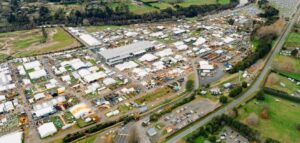Scholarship recipient takes on Antarctica
As the current recipient of Antarctica New Zealand’s Sir Robin Irvine Doctoral Scholarship, scientist Stephen Archer has taken his studies to Antarctica.
Scientist Stephen Archer has taken his work to one of the most hostile environments on the planet.
As the current recipient of Antarctica New Zealand’s Sir Robin Irvine Doctoral Scholarship, Stephen has received logistical support from Antarctica New Zealand and $40,000 towards his research in Antarctica and back here at home.

His research involves the study of melt water ponds in the McMurdo ice shelf and Dry Valleys of Antarctica, which saw him embark on an expedition to Bratina Island (near Scott Base) early this year.
From the samples collected he will attempt to identify what micro-organisms are present and how they respond to the highly variable environments present in his study area.
The biology of these lakes and ponds are some of the simplest recorded, consisting mostly of bacteria and other micro-organisms. Stephen identified from just one pond nearly 600 individual types of bacteria, which were layered according to their depth.
“It’s really interesting being able to see these differences,” Stephen says. “This pond was 48cm top to bottom, and over that distance we saw a huge change in the geochemistry and the microbial populations.
“These systems provide us an with an opportunity to examine the metabolic function that allows the microbial communities to thrive under such extreme conditions.” he says. “Yet, after decades of research we still know relatively little about Antarctic microbial biodiversity or the environmental factors that structure them.”
The chemical profile of the water column in Antarctic ponds is largely controlled by the rates of water supply versus evaporation. The vastly different ponds (all within walking distance of each another) provided Stephen with a unique laboratory to investigate interactions between the physical, chemical and biological aspects of the micro-organisms and their behaviour.
Back at the University of Waikato’s Thermophile Research Unit, huge minus 80 degree freezers are storing hundreds of Antarctic water and soil samples waiting for Stephen’s examination. His findings will help him to gain a better understanding of diverse microbial populations in comparison to the extreme nature of their surroundings.
Stephen’s study will expand on what is known about the community structure and how it came to be the way it is, as well as make predictions on how it may continue to evolve. Through further tests and experiments Stephen also hopes to provide accurate ways in which to assess the risks to the environment posed by possible cross-contamination.
Stephen, who was brought up on a “steady diet” of nature documentaries and a rock collection started by his grandparents, says science was the best way for him to understand and preserve the natural beauty of Antarctica.
“You don’t go there without a very good reason,” he says.
Even though New Zealand has one of the world’s best track records for leaving the frozen continent as close to how they found it as humanly possible, Stephen paraphrases a quote he heard at an an Antarctic conference in saying that “Antarctica is the greatest place we should never have been.”
In addition to Stephen’s PhD research, he has created a compilation video of time lapses and a virtual Antarctic tour captured during his latest trip to Antarctica. The images paint a dreamy picture of a day in the life of a scientist in the coldest place on earth.
The University of Waikato will be showing Stephen’s video in their Fieldays exhibit in association with Antarctic New Zealand and the International Centre for Terrestrial Antarctic Research.
During the past 30 years the university has been involved in a range of Antarctic research programmes. These have included studying and preserving the Antarctic huts from the historic Scott expedition, investigating the geothermal hotspots on Mt Erebus and in other locations, the microbiology of the ponds on the McMurdo ice shelf and the continuation of a long-term project with Landcare Research to gather wind and soil climatic data.
With a wife and two young children at home in New Zealand, Stephen says the long trips away can take their toll.
“During my last trip I spent over $100 on phone cards to call home,” says the father, who before his latest expedition had recordings made of him reading bedtime stories for his children.
And with the support of his family Stephen is able to pursue his second passion, a love for the natural environment. Particularly in Antarctica where the environment changes so fast that it is important to learn as much as possible before it disappears.
“Because it’s Antarctica,” Stephen says. “It’s our duty as researchers and as signing members to the Antarctic Treaty to try to preserve the Antarctic environment as best we can, and the best way to preserve is to understand.”




